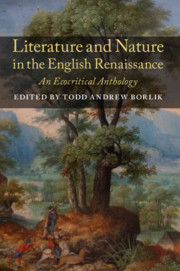Book contents
- Frontmatter
- Contents
- List of Illustrations
- Acknowledgements
- Editorial Principles: Towards the Ecocritical Editing of Renaissance Texts
- Introduction
- PART I Cosmologies
- PART II The Tangled Chain
- Hierarchy and the Human Animal
- Beasts
- Birds
- Fish
- Insects
- Plants
- Gems, Metals, Elements, Atoms
- PART III Time and Place
- PART IV Interactions
- PART V Environmental Problems in Early Modern England
- PART VI Disaster and Resilience in the Little Ice Age
- Appendix A Industrialization and Environmental Legislation in the Early Anthropocene: A Timeline
- Appendix B Further Reading: A Bibliography of Environmental Scholarship on the English Renaissance
Beasts
from PART II - The Tangled Chain
Published online by Cambridge University Press: 05 June 2019
- Frontmatter
- Contents
- List of Illustrations
- Acknowledgements
- Editorial Principles: Towards the Ecocritical Editing of Renaissance Texts
- Introduction
- PART I Cosmologies
- PART II The Tangled Chain
- Hierarchy and the Human Animal
- Beasts
- Birds
- Fish
- Insects
- Plants
- Gems, Metals, Elements, Atoms
- PART III Time and Place
- PART IV Interactions
- PART V Environmental Problems in Early Modern England
- PART VI Disaster and Resilience in the Little Ice Age
- Appendix A Industrialization and Environmental Legislation in the Early Anthropocene: A Timeline
- Appendix B Further Reading: A Bibliography of Environmental Scholarship on the English Renaissance
Summary
The first major work of English zoology was by and large a translation of a text compiled by the Swiss naturalist Conrad Gesner (1516–65). For modern readers, it is a book of perplexing contradictions. It rejects many of the superstitions recorded by Pliny, yet includes ambivalent entries for the unicorn (excerpted below) and lamia (a woman with a cat-like body covered in scales whose shapely breasts lure men to their doom). It stresses the authority of eyewitness accounts, yet recycles dozens of fabulous anecdotes from poets, classical historians, and especially the Bible as admissible evidence. It tries to pry off the theological goggles through which the medieval bestiary tradition had viewed non-humans, while still promoting zoology as a sacred science. Readers of Topsell's epistle will not be surprised to learn that the author himself was, like most Renaissance naturalists, a clergyman. With its startling mixture of lore and fact, superstition and scepticism, Topsell's bestiary is a representative specimen of its time.
Source: History of Four-Footed Beasts (1607), A4r–A6r, 712–13, 716, 719.
[Dedicatory Epistle°]
When I affirm that the knowledge of Beasts is Divine, I do mean no other thing than the right and perfect description of their names, figures, and natures, and this is in the Creator himself most Divine; and therefore such as is the fountain, such are the streams issuing from the same into the minds of men. Now it is most clear in Genesis how the Holy Ghost remembereth the creation of all living creatures, and the Four-footed next before the creation of man, as though they alone were appointed the Ushers, going immediately before the race of men …
The old Manichees ° among other blasphemies accused the creation of hurtful, venomous, ravening, and destroying Beasts, affirming them to be made by an evil God; and also they accused the creation of Mice and other unprofitable creatures, because their dullness was no kinder to the Lord (but like cruel and covetous misers, made no account of those Beasts which brought not profit to their purse).
- Type
- Chapter
- Information
- Literature and Nature in the English RenaissanceAn Ecocritical Anthology, pp. 113 - 137Publisher: Cambridge University PressPrint publication year: 2019



